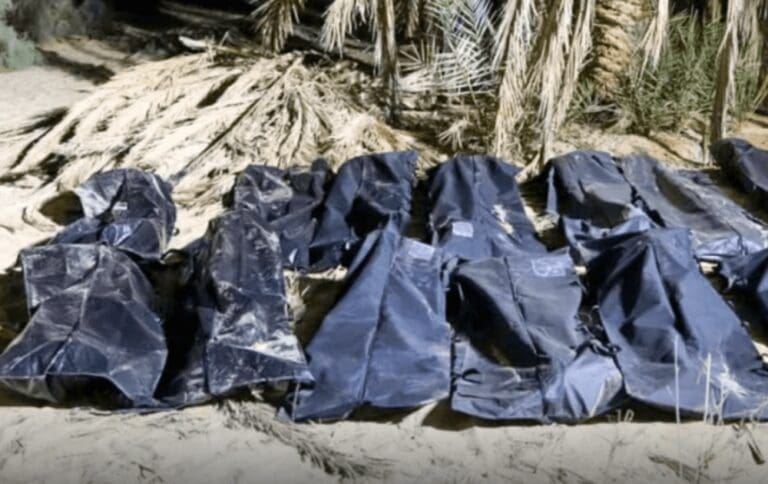Libyan authorities have uncovered nearly 50 bodies in two mass graves in the North African country’s desert in recent days, officials said on Sunday.
Plagued by chronic instability since the fall of Muammar Gaddafi’s regime in 2011, Libya remains a tragic crossroads for clandestine migration.
The recent rescue of 76 migrants, victims of human trafficking networks in the country’s southeast, underscores the magnitude of the crisis. The operation, carried out by the Illegal Immigration Control Authority in coordination with the Libyan Prosecutor General’s office and supported by the Sabil Al-Salam Battalion, also led to the grim discovery of 28 bodies in a mass grave near the detention site.
This intervention highlights both the local authorities’ efforts to combat these criminal networks and the scale of the abuses inflicted on vulnerable migrants. According to the prosecutor general’s office, the victims were subjected to torture, as well as inhumane and degrading treatment—systematic practices that reflect the impunity enjoyed by these criminal groups in certain Libyan regions.
Three individuals involved in these illicit activities—one Libyan national and two foreign nationals—were arrested during the operation. However, while significant, these arrests do little to mask the depth of the problem: Libya remains a fertile ground for traffickers, who exploit the security and institutional vacuum that has plagued the country for over a decade.
This tragedy is far from an isolated case. Late last month, more than 300 African migrants were found in similar conditions, detained in a farm in the Al-Wahat region in eastern Libya. This recurring pattern reveals the scale of a well-established human trafficking system, which relies on transnational networks stretching across Africa and beyond.
Libya’s geopolitical situation significantly worsens this humanitarian crisis. Divided between rival factions, Libya is a failed state where institutions struggle to maintain effective control over the territory. This fragmentation fosters the proliferation of armed militias and criminal groups, some of which are directly involved in human trafficking or turn a blind eye in exchange for financial gains.
Furthermore, Libya’s geographic position—as a gateway to Europe for thousands of desperate migrants—exacerbates migration pressures. Fleeing war, extreme poverty, or persecution in their home countries, migrants often fall into the hands of ruthless smugglers. These traffickers exploit their vulnerability, subjecting them to horrific violence to extort ransom or forcing them into human trafficking networks for labour exploitation.
MK/te/lb/as/APA


